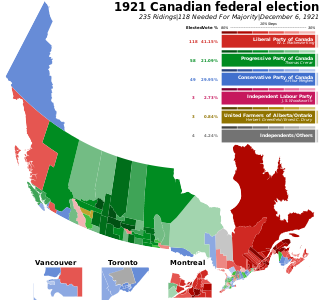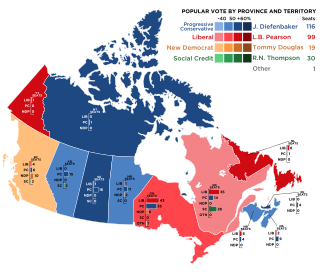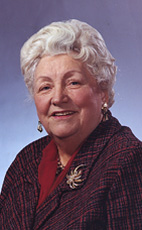Related Research Articles

The Parliament of Canada is the federal legislature of Canada, seated at Parliament Hill in Ottawa, and is composed of three parts: the King, the Senate, and the House of Commons. By constitutional convention, the House of Commons is dominant, with the Senate rarely opposing its will. The Senate reviews legislation from a less partisan standpoint and may initiate certain bills. The monarch or his representative, normally the governor general, provides royal assent to make bills into law.

The Senate of Canada is the upper house of the Parliament of Canada. Together with the Crown and the House of Commons, they compose the bicameral legislature of Canada.

The 1921 Canadian federal election was held on December 6, 1921, to elect members of the House of Commons of Canada of the 14th Parliament of Canada. The Union government that had governed Canada through the First World War was defeated, and replaced by a Liberal government under the young leader William Lyon Mackenzie King. A new third party, the Progressive Party, won the second most seats in the election.

The Parliament of the Republic of South Africa is South Africa's legislature; under the present Constitution of South Africa, the bicameral Parliament comprises a National Assembly and a National Council of Provinces. The current twenty-seventh Parliament was first convened on 22 May 2019.

The 1962 Canadian federal election was held on June 18, 1962, to elect members of the House of Commons of Canada of the 25th Parliament of Canada. The governing Progressive Conservative (PC) Party won a plurality of seats in this election, and its majority government was reduced to a minority government.
An independent, non-partisan politician or non-affiliated politician is a politician not affiliated with any political party or bureaucratic association. There are numerous reasons why someone may stand for office as an independent.

Josie Alice Quart, was a Canadian senator. A Progressive Conservative, she was appointed to the Senate of Canada on 16 November 1960 on the recommendation of Prime Minister John Diefenbaker. She represented the senatorial division of Victoria, Quebec until her death.
Olive Lillian Irvine was a Canadian teacher and politician.
Representation by women has been a significant issue in Canadian politics since 1900.
Hugh Macarthur Horner was a physician and surgeon. He served as a Canadian federal and provincial politician. Horner was born in Blaine Lake, Saskatchewan. He was a Minister of the Crown in the province of Alberta and worked on agricultural projects after leaving politics.
Founded in 2001 by Rosemary Speirs, Donna Dasko, Libby Burnham and Christina McCall. Equal Voice is a national, bilingual, multi-partisan, non-governmental, non-profit organization that promotes the election of more women to all levels of Canadian politics. Through public awareness campaigns, campaign schools, research, election tracking, and lobbying political parties, Equal Voice seeks to increase the numbers of women elected to public office federally, provincially and municipally.

The 40th Canadian Parliament was in session from November 18, 2008 to March 26, 2011. It was the last Parliament of the longest-running minority government in Canadian history that began with the previous Parliament. The membership of its House of Commons was determined by the results of the 2008 federal election held on October 14, 2008. Its first session was then prorogued by the Governor General on December 4, 2008, at the request of Prime Minister Stephen Harper, who was facing a likely no-confidence motion and a coalition agreement between the Liberal party and the New Democratic Party with the support of the Bloc Québécois. Of the 308 MPs elected at the October 14, 2008 general election, 64 were new to Parliament and three sat in Parliaments previous to the 39th: John Duncan, Jack Harris and Roger Pomerleau.
The 40th Canadian Parliament contained a record number of female Members of Parliament, with 69 women elected to the House of Commons of Canada in the 2008 federal election. However, this represented just 22 per cent of the 308 total MPs, and only a modest gain over the 65 women in the 39th Canadian Parliament.
Women were first allowed to vote at the federal level in Canada in the 1917 general election in connection with military service, and were allowed to vote under the same conditions as men beginning on May 24, 1918. The next four elections saw only one woman elected: Agnes Macphail. The 1936 election saw two women in the House together for the first time. A by-election in 1941 saw a woman elected to the governing caucus for the first time. The 22nd federal election in 1953 was a slight breakthrough, electing four women, which was 1.5% of the House. Every Parliament thenafter would have at least two women at a time, except for the 28th Parliament from 1968 to 1972, in which Grace MacInnis was the only woman. Then 30th Parliament, elected in 1974, was another breakthrough, containing nine women MPs following the general election and rising to ten due to a by-election in 1976. The number of women in the House would not fall below ten again.
During the 21st Canadian Parliament, the number of sitting women senators increased. Eleven women ran for seats in the Canadian House of Commons in the 1949 federal election; none were elected. However, Ellen Fairclough, who had run unsuccessfully in the Hamilton West riding as a Progressive Conservative, was elected in a May 1950 by-election held after the incumbent was appointed to the Ontario Supreme Court.
The number of women sitting in the House of Commons increased to a new maximum during the 22nd Canadian Parliament; the number of women senators also increased. 47 women ran for seats in the Canadian House of Commons in the 1953 federal election; four were elected.
The number of women sitting in the House of Commons increased to six during the 26th Canadian Parliament; the number of women senators remained at six. 40 women ran for seats in the Canadian House of Commons in the 1963 federal election; two women out of five incumbents were reelected. Ellen Fairclough, Isabel Hardie and Margaret Mary Macdonald were defeated when they ran for reelection. Pauline Jewett and Margaret Konantz were elected to the House of Commons in the general election; Eloise Jones and Margaret Rideout were elected in by-elections held in June 1964.
The 43rd Canadian Parliament once again set a record number of female Members of Parliament, with 98 women elected to the 338-member House of Commons of Canada (28.9%) in the 2019 election. Of those 98 women, 31 were elected for the first time in the 2019 election. 2 more women were elected in by-elections in October 2020, reaching the historic milestone of 100 women in the House of Commons for the first time. This represents a gain of twelve seats over the previous record of 88 women in the 42nd Canadian Parliament. By contrast, the 116th United States Congress had 102 women sitting in the 435-seat United States House of Representatives (23.4%).
The 44th Canadian Parliament includes a record number of female Members of Parliament, with 103 women elected to the 338-member House of Commons of Canada (30.5%) in the 2021 election. Of those 103 women, 22 were elected for the first time in the 2021 election. This represents a gain of five seats over the previous record of 98 women elected at the beginning of the 43rd Canadian Parliament, and a gain of three seats from the record high of 100 women during the previous parliamentary session following by-elections.
References
- ↑ "Memorial for political pioneer considered". Recorder and Times. Brockville. December 12, 2012.
- ↑ "Judy Lamarsh". The Canadian Encyclopedia .
- ↑ "Women in Politics". Elections PEI.
- ↑ "Olive Lillian Irvine (1895-1969)". Memorable Manitobans. Manitoba Historical Society.
- ↑ Josie Alice Quart – Parliament of Canada biography
- ↑ "History of Federal Ridings since 1867 | Parliament of Canada: Women Candidates in General Elections". www2.parl.gc.ca. Retrieved 2018-09-17.